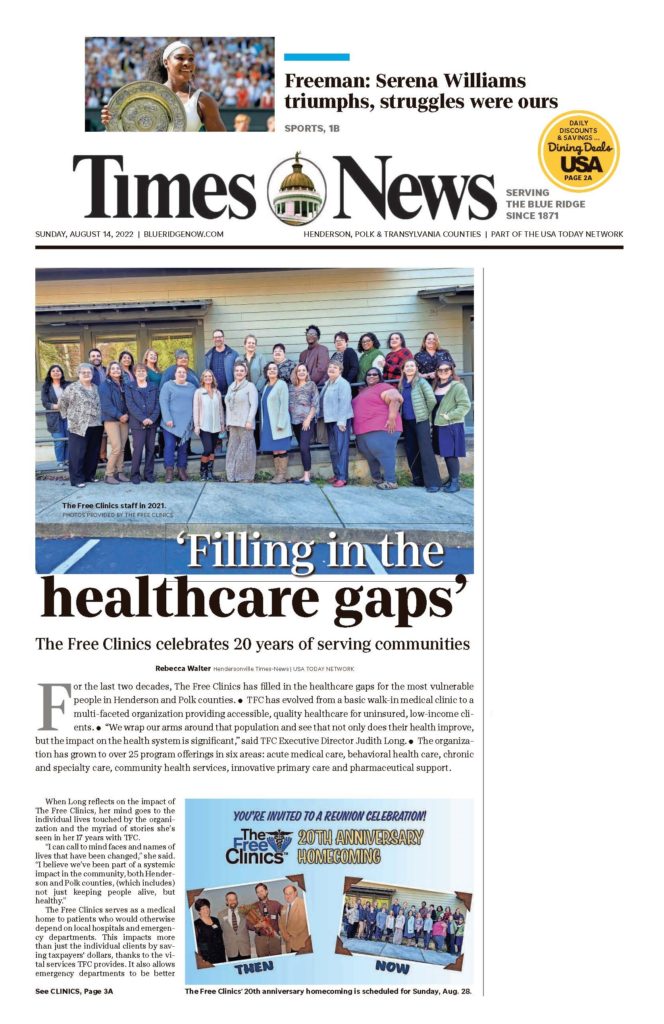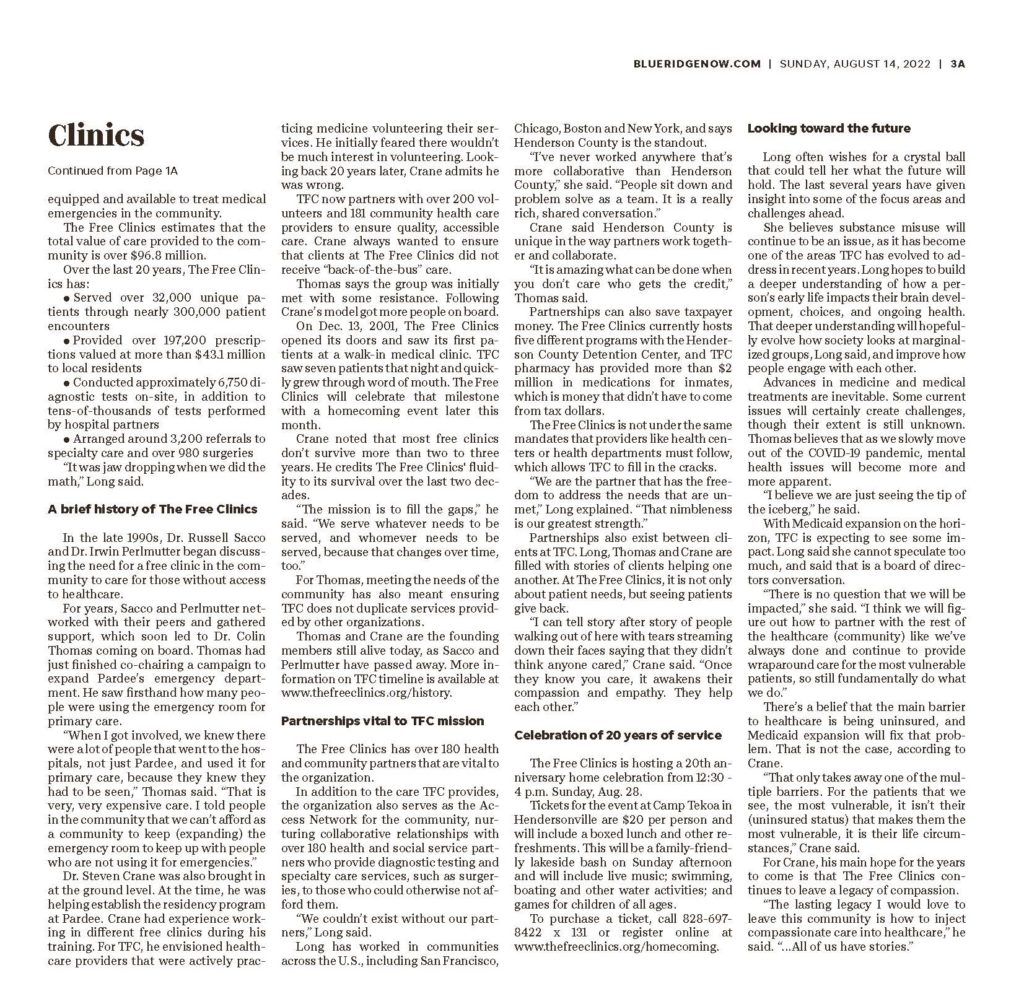‘Filling in the healthcare gaps’: The Free Clinics celebrates 20 years
By Rebecca Walter, Hendersonville Times-News


For the last two decades, The Free Clinics has filled in the healthcare gaps for the most vulnerable people in Henderson and Polk counties.
TFC has evolved from a basic walk-in medical clinic to a multi-faceted organization providing accessible, quality healthcare for uninsured, low-income clients.
“We wrap our arms around that population and see that not only does their health improve, but the impact on the health system is significant,” said TFC Executive Director Judith Long.
The organization has grown to over 25 program offerings in six areas: acute medical care, behavioral health care, chronic and specialty care, community health services, innovative primary care and pharmaceutical support.
When Long reflects on the impact of The Free Clinics, her mind goes to the individual lives touched by the organization and the myriad of stories she’s seen in her 17 years with TFC.
“I can call to mind faces and names of lives that have been changed,” she said. “I believe we’ve been part of a systemic impact in the community, both Henderson and Polk counties, (which includes) not just keeping people alive, but healthy.”
The Free Clinics serves as a medical home to patients who would otherwise depend on local hospitals and emergency departments. This impacts more than just the individual clients by saving taxpayers’ dollars, thanks to the vital services TFC provides. It also allows emergency departments to be better equipped and available to treat medical emergencies in the community.
The Free Clinics estimates that the total value of care provided to the community is over $96.8 million.
Over the last 20 years, The Free Clinics has:
- Served over 32,000 unique patients through nearly 300,000 patient encounters
- Provided over 197,200 prescriptions valued at more than $43.1 million to local residents
- Conducted approximately 6,750 diagnostic tests on-site, in addition to tens-of-thousands of tests performed by hospital partners
- Arranged around 3,200 referrals to specialty care and over 980 surgeries
“It was jaw dropping when we did the math,” Long said.
A brief history of The Free Clinics
In the late 1990s, Dr. Russell Sacco and Dr. Irwin Perlmutter began discussing the need for a free clinic in the community to care for those without access to healthcare.
For years, Sacco and Perlmutter networked with their peers and gathered support, which soon led to Dr. Colin Thomas coming on board. Thomas had just finished co-chairing a campaign to expand Pardee’s emergency department. He saw firsthand how many people were using the emergency room for primary care.
“When I got involved, we knew there were a lot of people that went to the hospitals, not just Pardee, and used it for primary care, because they knew they had to be seen,” Thomas said. “That is very, very expensive care. I told people in the community that we can’t afford as a community to keep (expanding) the emergency room to keep up with people who are not using it for emergencies.”
Dr. Steven Crane was also brought in at the ground level. At the time, he was helping establish the residency program at Pardee. Crane had experience working in different free clinics during his training. For TFC, he envisioned healthcare providers that were actively practicing medicine volunteering their services. He initially feared there wouldn’t be much interest in volunteering. Looking back 20 years later, Crane admits he was wrong.
TFC now partners with over 200 volunteers and 181 community health care providers to ensure quality, accessible care. Crane always wanted to ensure that clients at The Free Clinics did not receive “back-of-the-bus” care.
Thomas says the group was initially met with some resistance. Following Crane’s model got more people on board.
On Dec. 13, 2001, The Free Clinics opened its doors and saw its first patients at a walk-in medical clinic. TFC saw seven patients that night and quickly grew through word of mouth. The Free Clinics will celebrate that milestone with a homecoming event later this month.
Crane noted that most free clinics don’t survive more than two to three years. He credits The Free Clinics’ fluidity to its survival over the last two decades.
“The mission is to fill the gaps,” he said. “We serve whatever needs to be served, and whomever needs to be served, because that changes over time, too.”
For Thomas, meeting the needs of the community has also meant ensuring TFC does not duplicate services provided by other organizations.
Thomas and Crane are the founding members still alive today, as Sacco and Perlmutter have passed away. More information on TFC timeline is available at www.thefreeclinics.org/history.
Partnerships vital to TFC mission
The Free Clinics has over 180 health and community partners that are vital to the organization.
In addition to the care TFC provides, the organization also serves as the Access Network for the community, nurturing collaborative relationships with over 180 health and social service partners who provide diagnostic testing and specialty care services, such as surgeries, to those who could otherwise not afford them.
“We couldn’t exist without our partners,” Long said.
Long has worked in communities across the U.S., including San Francisco, Chicago, Boston and New York, and says Henderson County is the standout.
“I’ve never worked anywhere that’s more collaborative than Henderson County,” she said. “People sit down and problem solve as a team. It is a really rich, shared conversation.”
Crane said Henderson County is unique in the way partners work together and collaborate.
“It is amazing what can be done when you don’t care who gets the credit,” Thomas said.
Partnerships can also save taxpayer money. The Free Clinics currently hosts five different programs with the Henderson County Detention Center, and TFC pharmacy has provided more than $2 million in medications for inmates, which is money that didn’t have to come from tax dollars.
The Free Clinics is not under the same mandates that providers like health centers or health departments must follow, which allows TFC to fill in the cracks.
“We are the partner that has the freedom to address the needs that are unmet,” Long explained. “That nimbleness is our greatest strength.”
Partnerships also exist between clients at TFC. Long, Thomas and Crane are filled with stories of clients helping one another. At The Free Clinics, it is not only about patient needs, but seeing patients give back.
“I can tell story after story of people walking out of here with tears streaming down their faces saying that they didn’t think anyone cared,” Crane said. “Once they know you care, it awakens their compassion and empathy. They help each other.”
Celebration of 20 years of service
The Free Clinics is hosting a 20th anniversary home celebration from 12:30 – 4 p.m. Sunday, Aug. 28.
Tickets for the event at Camp Tekoa in Hendersonville are $20 per person and will include a boxed lunch and other refreshments. This will be a family-friendly lakeside bash on Sunday afternoon and will include live music; swimming, boating and other water activities; and games for children of all ages.
To purchase a ticket, call 828-697-8422 x 131 or register online at www.thefreeclinics.org/homecoming.
Looking toward the future
Long often wishes for a crystal ball that could tell her what the future will hold. The last several years have given insight into some of the focus areas and challenges ahead.
She believes substance misuse will continue to be an issue, as it has become one of the areas TFC has evolved to address in recent years. Long hopes to build a deeper understanding of how a person’s early life impacts their brain development, choices, and ongoing health. That deeper understanding will hopefully evolve how society looks at marginalized groups, Long said, and improve how people engage with each other.
Advances in medicine and medical treatments are inevitable. Some current issues will certainly create challenges, though their extent is still unknown. Thomas believes that as we slowly move out of the COVID-19 pandemic, mental health issues will become more and more apparent.
“I believe we are just seeing the tip of the iceberg,” he said.
With Medicaid expansion on the horizon, TFC is expecting to see some impact. Long said she cannot speculate too much, and said that is a board of directors conversation.
“There is no question that we will be impacted,” she said. “I think we will figure out how to partner with the rest of the healthcare (community) like we’ve always done and continue to provide wraparound care for the most vulnerable patients, so still fundamentally do what we do.”
There’s a belief that the main barrier to healthcare is being uninsured, and Medicaid expansion will fix that problem. That is not the case, according to Crane.
“That only takes away one of the multiple barriers. For the patients that we see, the most vulnerable, it isn’t their (uninsured status) that makes them the most vulnerable, it is their life circumstances,” Crane said.
For Crane, his main hope for the years to come is that The Free Clinics continues to leave a legacy of compassion.
“The lasting legacy I would love to leave this community is how to inject compassionate care into healthcare,” he said. “…All of us have stories.”
Originally published on Blueridgenow.com
8/14/2022
About the author